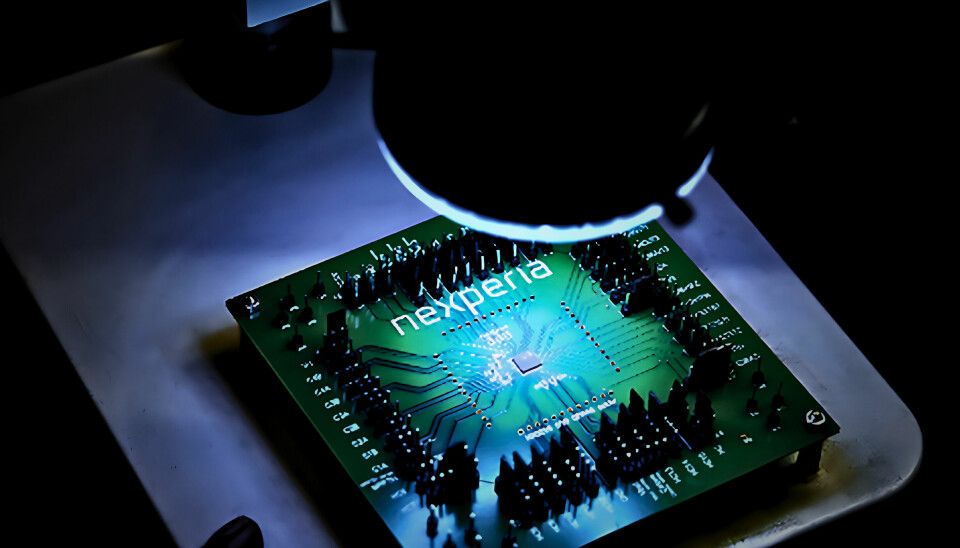Production Disruption Imminent
Nexperia standoff imperils global auto production within weeks

A trade dispute between the US and China has left automakers scrambling. The Dutch government's seizure of chipmaker Nexperia and Beijing's swift retaliation have severed supplies of essential semiconductors, threatening production halts across Europe and North America.
Nexperia crisis: Semiconductor supply shock threatens global auto production
The semiconductor industry is experiencing its most acute geopolitical crisis since the pandemic, one that exposes the fragility underlying decades of globalised manufacturing. At its centre is Nexperia, a Dutch-headquartered chipmaker that has become caught in the escalating trade war between Washington and Beijing, with production stoppages now looming as a genuine threat across Europe and North America within weeks rather than months.
The crisis began to crystallise in early October when China's Ministry of Commerce imposed export restrictions preventing Nexperia China and its subcontractors from exporting certain finished components and sub-assemblies manufactured on Chinese soil. This retaliation came swiftly after the Dutch government invoked emergency powers to seize control of the company, citing grave governance deficiencies and threats to European economic security. What started as a governance dispute between The Hague and Nexperia's Chinese parent company, Wingtech Technology, has metastasised into a production and supply chain emergency that touches virtually every automotive manufacturer on both sides of the Atlantic.
We are deeply concerned by potential significant disruption to European vehicle manufacturing if the interruption of Nexperia chips supplies cannot be immediately resolved
The scale of the crisis cannot be overstated. Nexperia produces hundreds of millions of chips annually across a sprawling portfolio of discrete semiconductors, diodes, transistors and MOSFETs (Metal Oxide Semiconductor Field-Effect Transistors, a type of semiconductor device used for switching and amplifying electronic signals) that perform unglamorous but absolutely vital functions in vehicles.
These chips operate everything from switches to steering wheel controls, embedded in the electrical systems and power management units that modern vehicles depend upon. The company operates manufacturing facilities in Hamburg, Manchester and Nijmegen, with a combined capacity exceeding 50 billion components annually. Yet supply is about to evaporate.
On 10 October, automakers and their tier 1 suppliers received notice from Nexperia that it could no longer guarantee delivery of its chips to the automotive supply chain. The implications for automotive production are baked-in. Following the communication, the European Automobile Manufacturers' Association (ACEA) reported that existing stocks would last only several weeks. "We are deeply concerned by potential significant disruption to European vehicle manufacturing if the interruption of Nexperia chips supplies cannot be immediately resolved," the association's director general, Sigrid de Vries, stated. "This is a cross-industry issue affecting a large number of suppliers and virtually all of our members."
Why Nexperia's chips are non-negotiable for the auto sector
What renders Nexperia's position so indispensable is not that it produces cutting-edge semiconductor technology. Quite the opposite. The company specialises in mature, proven technologies that have been refined over decades. These so-called legacy chips possess advantages that newer semiconductors cannot replicate.
They carry stringent automotive qualification certifications such as AEC Q100 and Q101, which demand extraordinary reliability standards. Switching to alternative suppliers means recertifying components through lengthy homologation processes that cannot be compressed into days or weeks.
More critically, Nexperia's products are embedded within preassembled components supplied by tier 1 manufacturers such as Bosch, Denso and others. The chips do not arrive as standalone elements that suppliers can easily swap out. They are soldered into complex assemblies that feed directly into vehicle electrical architecture. Tracing Nexperia components through these nested supply chains represents a formidable intellectual challenge, made more acute because many tier 1 suppliers themselves lack complete visibility into their own subcomponent sourcing. A single Nexperia chip failure cascades through entire production lines.
BMW acknowledged on 16 October that "parts of its supplier network were already being affected," although the German manufacturer insisted that "production continues at BMW's plants as planned." This carefully hedged language suggests the company is experiencing disruptions in non-critical supply channels but has yet to encounter facility-wide halts. Volkswagen, Mercedes-Benz, Stellantis and Renault all stated they were monitoring the situation and in some cases preparing task forces to mitigate potential disruptions. Some automakers confided to Reuters that United States auto plants could face production impacts as soon as November, though they declined to be named due to the sensitivity of the issue.
[There are] well founded reasons to doubt sound management
The extraordinary Dutch intervention
The Dutch government's actions represent a remarkable escalation in Western industrial policy. On 13 October, invoking the Goods Availability Act (Wet Beschikbaarheid Goederen), the Dutch Ministry of Economic Affairs took temporary control of Nexperia. This law, a relic of Cold War emergency planning, has remained virtually dormant for decades. It allows the state to intervene in private companies during emergencies or when critical supplies face disruption. Applying it to a major semiconductor manufacturer marks perhaps the most significant use of the statute in contemporary times and signals how gravely governments now view threats to technological sovereignty.
The Dutch court cited "well founded reasons to doubt sound management" under the leadership of Wingtech chairman Zhang Xuezheng, who was immediately suspended from his positions as executive director and nonexecutive director of Nexperia Holdings. The government simultaneously prohibited the company from altering its assets, intellectual property, operations or personnel for one year without explicit consent.
A newly appointed interim chief executive officer, initially identified as Stefan Tilger, assumed control of operations. Nexperia announced the appointment of an independent non-Chinese board member with decisive voting power, a capitulation to Western pressure that underscores the depth of trust erosion between Beijing and Amsterdam.
Wingtech responded with measured fury, arguing through archived social media posts that the Dutch government's intervention constituted "excessive interference driven by geopolitical bias, rather than a fact-based risk assessment." The company emphasised that it had "strictly abided by the laws and regulations of all jurisdictions where it operates" since acquiring Nexperia for $3.63 billion in 2018. Wingtech shares plummeted by their maximum daily limit of 10 per cent on the Shanghai Stock Exchange upon announcement of the Dutch seizure, reflecting market anxiety about potential earnings impairment and broader geopolitical instability. Yet Beijing's export restrictions on Nexperia had already begun taking effect, rendering Wingtech's protestations largely academic.
The geopolitical trap
This crisis does not exist in isolation. It represents a crystallisation of tensions that have accumulated over years of intensifying technology competition between the United States and China. Washington had already placed Wingtech on its "entity list" in December 2024, designating the company as a national security risk and restricting technology transfers. On 29 September this year, the US Bureau of Industry and Security expanded export controls to encompass all entities at least 50 per cent owned by companies on the entity list, a provision that directly ensnared Nexperia regardless of its Dutch registration.
If the shipment of automotive chips doesn't resume quickly, it's going to disrupt auto production in the US and many other countries and have a spillover effect in other industries
China's responses followed predictable logic. Beyond blocking Nexperia exports from Chinese soil, Beijing tightened export controls on rare earth elements critical to semiconductor manufacturing, citing national security interests. Foreign companies wishing to export designated rare earths must now obtain government approval and disclose end-use applications. The United States responded to these restrictions with President Donald Trump's threat of 100 per cent tariffs on Chinese exports, escalating tensions that show no signs of de-escalation.
The timing crystallised extraordinary pressure on all three parties. The Dutch government has been navigating US expectations for technology export coordination whilst managing its own economic interest in preserving Nexperia as a functioning enterprise. China has deployed its control over supply chains as geopolitical leverage. The United States has intensified pressure on allied governments to screen Chinese technology investments and secure supply chains. Automakers, meanwhile, find themselves stranded in the middle of a conflict they did not create and cannot easily resolve.
The industrial response
The Alliance for Automotive Innovation, representing General Motors, Toyota, Ford, Volkswagen, Hyundai and nearly all major automakers globally, issued an urgent warning. "If the shipment of automotive chips doesn't resume quickly, it's going to disrupt auto production in the US and many other countries and have a spillover effect in other industries," the group's chief executive officer, John Bozzella, cautioned. "It's that significant."
Volkswagen has established a dedicated task force to investigate how its largest suppliers and their hundreds of component variants are potentially affected. Whilst the group does not source Nexperia chips directly, the company acknowledged that some Nexperia components find their way into assemblies that feed into its vehicles.Stellantis reported that it is "collaborating with Nexperia and other suppliers to assess potential impacts and develop mitigation measures." Renault stated it was monitoring developments, though cautioned that it remained "too early to make a definitive statement."
The practical challenge confronting automakers is formidable. Unlike consumer electronics manufacturers who can delay non-essential products, automotive production operates on precisely calibrated just-in-time schedules. A shortage of chips totalling perhaps a tenth of a per cent of total semiconductor content can render entire vehicle architectures inoperable. Suppliers must obtain certification for replacement components, a process that typically demands weeks to months under normal circumstances. Current conditions are anything but normal.
The broader warning
What the Nexperia crisis illuminates is a fundamental restructuring of risk within industrial supply chains. For decades, globalised manufacturing assumed that open markets and stable regulatory environments would prevail. Companies pursued cost optimisation strategies that concentrated supply within geographically dispersed but ultimately vulnerable networks. Nexperia itself emerged from Philips, one of Europe's postwar industrial titans whose semiconductor operations were successively sold, divested and spun into the open market economy.
The Dutch government's seizure, though extraordinary in form, reflects a conscious decision that such vulnerabilities are no longer tolerable. Other Western governments have signalled similar conclusions. The United States passed the CHIPS and Science Act. Europe launched its Chips Act, though a European Court of Auditors report in April 2025 cast doubt on the initiative's ability to meet its 20 per cent market share target, projecting a more modest 11.7 per cent share by 2030, citing ambitious goals, insufficient funding, and intense competition from countries' rival incentive policies.
For automakers and their suppliers, the immediate imperative is survival through the next weeks whilst supply chains remain disrupted. The medium-term imperative is redesigning supplier relationships and inventory strategies to reduce exposure to such geopolitical shocks. The long-term imperative may prove more profound still: a fundamental reconsideration of whether globalised just-in-time manufacturing remains viable in an era of intensifying state intervention and technology competition.
Current stocks of Nexperia chips are expected to sustain production for several weeks at most. Within that window, the parties involved must achieve breakthrough negotiations or face production stoppages that could reverberate through the global economy for months to come.








